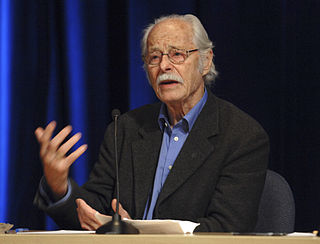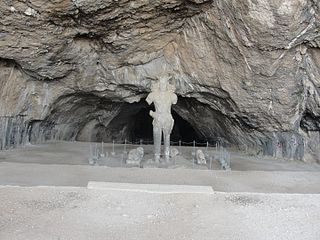Related Research Articles

Haleh Afshar, Baroness Afshar, was a British life peer in the House of Lords. She had a life-long interest in women's rights and Islamic law. She was a professor at the University of York and she wrote over a dozen scholarly books.

Thomas Fredrik Weybye Barth was a Norwegian social anthropologist who published several ethnographic books with a clear formalist view. He was a professor in the Department of Anthropology at Boston University, and previously held professorships at the University of Oslo, the University of Bergen, Emory University and Harvard University. He was appointed a government scholar in 1985.

Kazerun is a city in the Central District of Kazerun County, Fars province, Iran, serving as capital of both the county and the district.

Talal Asad is a Saudi-born British-Pakistani cultural anthropologist who is currently Distinguished Professor Emeritus of Anthropology and Middle Eastern Studies at the Graduate Center of the City University of New York. His prolific body of work mainly focuses on religiosity, Middle Eastern studies, postcolonialism, and notions of power, law and discipline. He is also known for his writing calling for an anthropology of secularism.

Homa Darabi was an Iranian child psychiatrist, academic, and political activist affiliated with the Nation Party of Iran. She is known for her political self-immolation in protest to the compulsory hijab, which led to her death.
Haleh Esfandiari is an Iranian-American academic and former Director of the Middle East Program at the Woodrow Wilson International Center for Scholars in Washington, D.C. Her areas of expertise include Middle Eastern women's issues, contemporary Iranian intellectual currents and politics, and democratic developments in the Middle East. She was detained in solitary confinement at Evin Prison in Tehran, Iran for more than 110 days from May 8 to August 21, 2007.
Saddeka Mohammed Arebi was an American/Arab American social anthropologist and author. Born in the Libyan capital of Tripoli, she immigrated with her family to the United States during the late 1970s, eventually settling in Northern California. After obtaining her doctorate, she subsequently served as a Professor of Anthropology at the University of California, Berkeley, San Francisco State University, and Saint Mary's College of California. She was also an active member of the Muslim World League, one of the largest in the world consisting of Muslim religious figures from twenty-two countries. She died in July 2007 while visiting relatives in Libya.
Philip Carl Salzman is professor emeritus of anthropology at McGill University, Quebec, Canada.

The Iranian Women's Rights Movement, is the social movement for women's rights of the women in Iran. The movement first emerged after the Iranian Constitutional Revolution in 1910, the year in which the first women's periodical was published by women. The movement lasted until 1933 when the last women's association was dissolved by the government of Reza Shah Pahlavi. It rose again after the Iranian Revolution in 1979.
The Association of the Women of the Islamic Republic is an Iranian reformist political party. It was the first officially registered party of the Islamic Republic of Iran.
The concept of martyrdom is understood in the Western world as facing persecution and giving of one's life for a set of beliefs, most often religious beliefs. The definition of martyrdom is expanded in Iran, where martyrs are greatly revered, including martyrs from the distant past as well as martyrs from the modern age. In Iran, Shia Islam is the majority religion, at 89% of the estimated 79 million inhabitants, and is a very important part of public and political life. The Shia concept of Martyrdom has been shaped by the deaths of the early martyrs of the Shia faith, Ali and Husayn ibn Ali, and Iranian society and government have further shaped the understanding of martyrdom in the modern age.
Eric James Hooglund is an American political scientist and an expert on contemporary Iran. Since 2010 he has been a senior research professor at the Center for Middle Eastern Studies at Lund University in Sweden.

Magic, Witchcraft and the Otherworld: An Anthropology is an anthropological study of contemporary Pagan and ceremonial magic groups that practiced magic in London, England, during the 1990s. It was written by English anthropologist Susan Greenwood based upon her doctoral research undertaken at Goldsmiths' College, a part of the University of London, and first published in 2000 by Berg Publishers.
Ziba Mir-Hosseini is an Iranian-born legal anthropologist, specialising in Islamic law, gender and development. She received her PhD in anthropology from Cambridge University and is the author of several books on Islam, gender, and the family.
Roksana Bahramitash is an Iranian-born Canadian sociologist, author, and professor. Her work focuses on women, employment and the informal economy in the Middle East and North Africa (MENA), as well as gender segregation in Islam, and microeconomics. In post-revolution Iran, Bahramitash was working on improving peasant women's literacy and access to economic development resources.
Pardis Mahdavi is an American scholar and former president of University of La Verne. Previously, she was the provost and executive vice president of the University of Montana, the dean of social sciences at Arizona State University, acting dean of Josef Korbel School of International Studies at the University of Denver, and the dean of women and chair of anthropology at Pomona College.

Pedram Khosronejad is a socio-cultural and visual anthropologist of contemporary Iran. He is of Iranian origin and commenced his studies in painting and in Visual Art Research before moving to France with a Ph.D. grant in 2000. He obtained his D.E.A. at Ecole Pratique des Hautes Etudes and obtained his Ph.D. at the École des Hautes Études en Sciences Sociales (Paris). His research interests include cultural and social anthropology, the anthropology of death and dying, visual anthropology, visual piety, holy artifacts, and religious material culture, with a particular interest in Iran, Persianate societies and the Islamic world.
Anthropology is the study of various aspects of humans within past and present societies. This study is practiced in multiple countries, each of whom has their own history of how anthropology has developed in their respective countries.
Dr. Faye Venetia Harrison is an American anthropologist. Her research interests include political economy, power, diaspora, human rights, and the intersections of race, gender, and class. She is currently Professor of African American Studies and Anthropology at the University of Illinois at Urbana-Champaign. She formerly served as Joint Professor of Anthropology and African American Studies at the University of Florida. Harrison received her BA in Anthropology in 1974 from Brown University, and her MA and PhD in Anthropology from Stanford University in 1977 and 1982, respectively. She has conducted research in the US, UK, and Jamaica. Her scholarly interests have also taken her to Cuba, South Africa, and Japan.
References
- 1 2 Elizabeth Sleeman (2001). The International Who's Who of Women 2002. Psychology Press. p. 284. ISBN 978-1-85743-122-3.
- 1 2 3 4 5 Moghadam, Val (1993). "Review of Iranian Immigrants and Refugees in Norway". Iranian Studies. 26 (1/2) (1/2): 185–187. doi:10.1017/S0021086200003236. JSTOR 4310843. S2CID 245655884.
- ↑ Shahram Akbarzadeh; Abdullah Saeed (2001). Muslim Communities in Australia. UNSW Press. p. ix. ISBN 978-0-86840-580-3.
- 1 2 Kamalkhani, Zahra. 1993. "Women's Everyday Religious Discourse in Iran." In Women in the Middle East: Perceptions, Realities, and Struggles for Liberation, by Haleh Afshar, 85-95. New York: St. Martin's Press.
- 1 2 3 Kamalkhani, Zahra (1998). Women's Islam : religious practice among women in today's Iran. London New York Kegan Paul International. ISBN 9781136173790.
- ↑ Women in the Middle East - Perceptions, Realities and Struggles for Liberation | Haleh Afshar | Palgrave Macmillan.